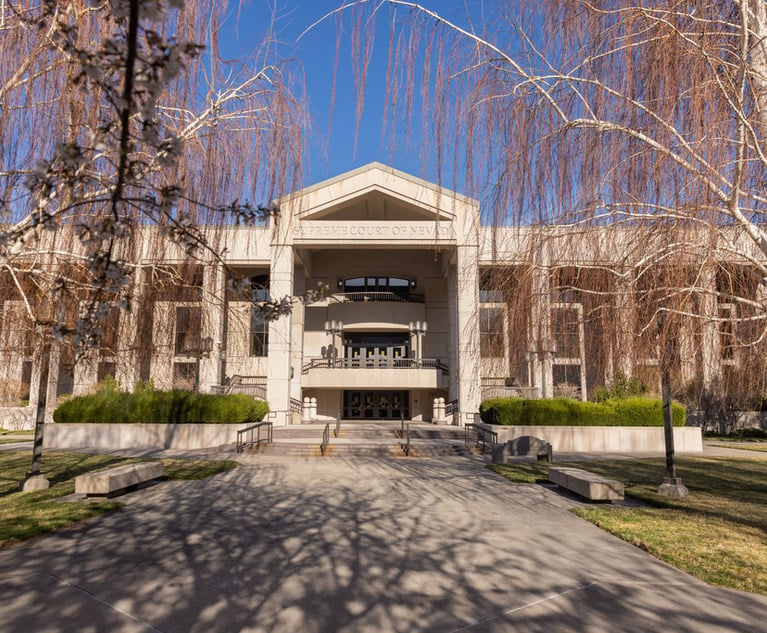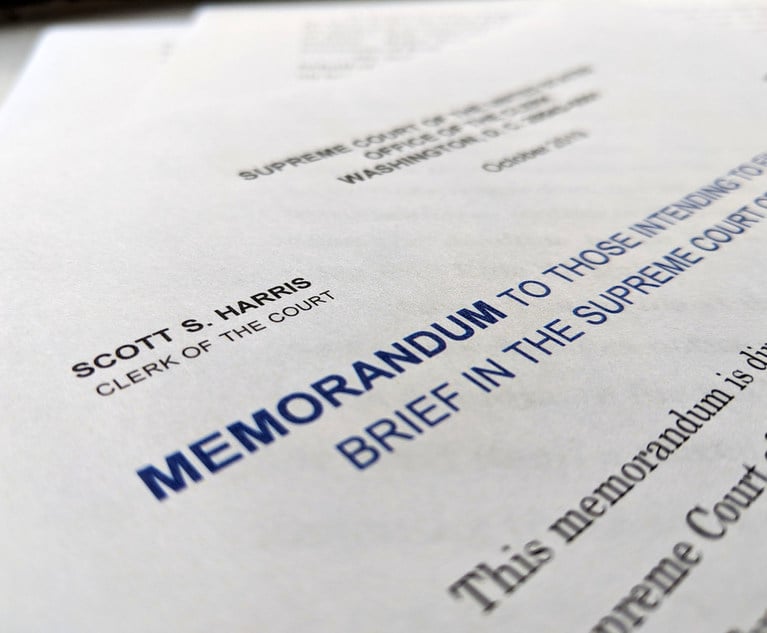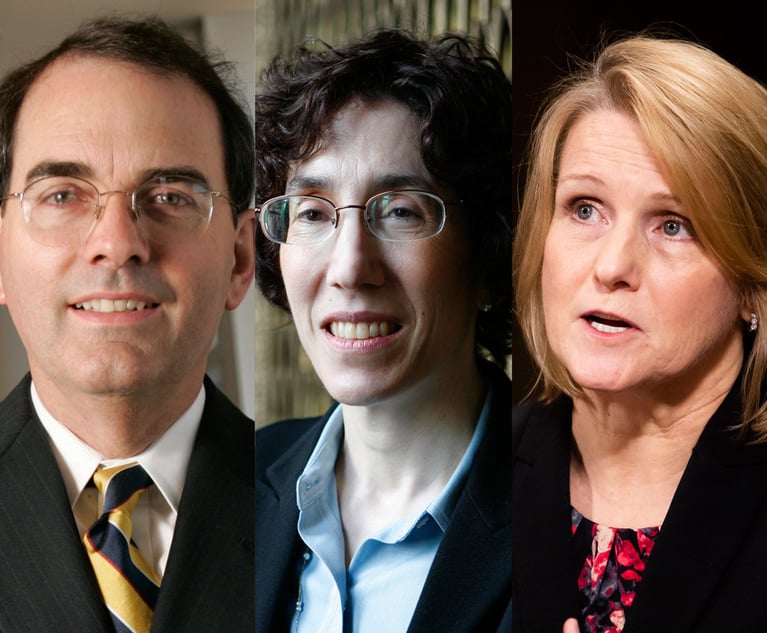 Justice Clarence Thomas in 2017 spoke on Fox News.
Justice Clarence Thomas in 2017 spoke on Fox News.Clarence Thomas Resumes a Quixotic Campaign, and Gets a Gorsuch Nod
Justice Clarence Thomas agreed with the outcome Wednesday in the excessive-fines case "Timbs v. Indiana." He would have taken a different path to get there.
February 20, 2019 at 03:04 PM
4 minute read
For the last 20 years, U.S. Supreme Court Justice Clarence Thomas has been urging his colleagues to use a novel originalist approach to protecting constitutional rights. In a decision on Wednesday, Thomas revived his campaign and finally picked up a possible ally, but only one: Justice Neil Gorsuch.
In Timbs v. Indiana, the high court unanimously ruled that the Eighth Amendment clause barring the imposition of “excessive fines” applies to states as well as the federal government because of the due process clause of the Fourteenth Amendment.
Thomas and Gorsuch agreed with the result, but Thomas wrote:
“I cannot agree with the route the court takes to reach this conclusion. Instead of reading the Fourteenth Amendment's due process clause to encompass a substantive right that has nothing to do with 'process,' I would hold that the right to be free from excessive fines is one of the 'privileges or immunities of citizens of the United States' protected by the Fourteenth Amendment.”
More tentatively, Gorsuch wrote in a separate concurrence: “As an original matter, I acknowledge, the appropriate vehicle for incorporation may well be the Fourteenth Amendment's privileges or immunities clause, rather than, as this court has long assumed, the due process clause.”
It is not unusual for Thomas to go solo in his dissents and concurrences, in which he often expresses hope that someday, his unique view of the Constitution will prevail.
Just on Tuesday, Thomas said it was time to revisit New York Times v. Sullivan, a First Amendment landmark ruling that has made it almost impossible for public figures to win libel lawsuits.
Thomas has been arguing ever since 1999 that the “privileges or immunities” clause is a stronger rationale for justifying fundamental rights than the due process clause. In Saenz v. Roe, a fluke ruling that invoked that clause to protect the right to travel, Thomas said: “I would be open to reevaluating its meaning in an appropriate case.”
But that case never came, although it was invoked in McDonald v. Chicago, the 2010 ruling that applied the Second Amendment right to bear arms to states. A splintered court decision concluded that “there is no need” to rely on the immunities clause because due process would suffice. In the Timbs case, Thomas said that substantive due process is an ill-defined “legal fiction” that allows the court to “fashion fundamental rights without any textual constraints.”
Writing broadly, Thomas accused the court of “defining the universe of 'fundamental' rights so broadly as to border on meaningless.” He pointed to the court's 2015 decision permitting same-sex marriage and to the 1992 ruling that said states cannot place an “undue burden” on a woman's right to an abortion. In both rulings, Thomas voted in dissent.
Why do justices—liberal and conservative—avoid embracing the privileges cause?
Soon after the Fourteenth Amendment was ratified, the court in 1873 sharply narrowed its scope in the Slaughterhouse Cases, and its meaning has not been fully reassessed since.
“The view has been, 'let sleeping doctrinal lines lie,'” Cato Institute scholar Ilya Shapiro said Wednesday, who along with court-watcher Josh Blackman predicted that Gorsuch would join Thomas in the Timbs case. “It's disappointing that Justice Gorsuch alone is now on record alongside Justice Thomas.”
David Gans of the liberal Constitutional Accountability Center said Wednesday, “It's significant that we have two justices now recognizing the importance of 'privileges or immunities.' We'll see how things develop.”
This content has been archived. It is available through our partners, LexisNexis® and Bloomberg Law.
To view this content, please continue to their sites.
Not a Lexis Subscriber?
Subscribe Now
Not a Bloomberg Law Subscriber?
Subscribe Now
NOT FOR REPRINT
© 2024 ALM Global, LLC, All Rights Reserved. Request academic re-use from www.copyright.com. All other uses, submit a request to [email protected]. For more information visit Asset & Logo Licensing.
You Might Like
View All
Divided 5th Circuit Shoots Down Nasdaq Diversity Rules

Nevada Supreme Court to Decide Fate of Groundbreaking Contingency Cap Ballot Measure
5 minute read
Lawyers, Law Groups Oppose Proposal to Require Court Approval for Amicus Briefs

9th Circuit Judges Weigh if Section 230 Shields Grindr From Defective Design Claims
Trending Stories
- 1Clifford Chance Hikes Partner Pay as UK Firms Fight to Stay Competitive on Compensation
- 2Judicial Conduct Watchdog Opposes Supreme Court Justice's Bid to Withdraw Appeal of Her Removal
- 3Lessons in Mediation & Negotiation: Attorneys' Reflections on Jimmy Carter
- 4Legal Issues to Watch in the US Appeals Courts in 2025
- 5Ex-MoviePass CEO Submits to Ban, Settling SEC Allegations
Who Got The Work
Michael G. Bongiorno, Andrew Scott Dulberg and Elizabeth E. Driscoll from Wilmer Cutler Pickering Hale and Dorr have stepped in to represent Symbotic Inc., an A.I.-enabled technology platform that focuses on increasing supply chain efficiency, and other defendants in a pending shareholder derivative lawsuit. The case, filed Oct. 2 in Massachusetts District Court by the Brown Law Firm on behalf of Stephen Austen, accuses certain officers and directors of misleading investors in regard to Symbotic's potential for margin growth by failing to disclose that the company was not equipped to timely deploy its systems or manage expenses through project delays. The case, assigned to U.S. District Judge Nathaniel M. Gorton, is 1:24-cv-12522, Austen v. Cohen et al.
Who Got The Work
Edmund Polubinski and Marie Killmond of Davis Polk & Wardwell have entered appearances for data platform software development company MongoDB and other defendants in a pending shareholder derivative lawsuit. The action, filed Oct. 7 in New York Southern District Court by the Brown Law Firm, accuses the company's directors and/or officers of falsely expressing confidence in the company’s restructuring of its sales incentive plan and downplaying the severity of decreases in its upfront commitments. The case is 1:24-cv-07594, Roy v. Ittycheria et al.
Who Got The Work
Amy O. Bruchs and Kurt F. Ellison of Michael Best & Friedrich have entered appearances for Epic Systems Corp. in a pending employment discrimination lawsuit. The suit was filed Sept. 7 in Wisconsin Western District Court by Levine Eisberner LLC and Siri & Glimstad on behalf of a project manager who claims that he was wrongfully terminated after applying for a religious exemption to the defendant's COVID-19 vaccine mandate. The case, assigned to U.S. Magistrate Judge Anita Marie Boor, is 3:24-cv-00630, Secker, Nathan v. Epic Systems Corporation.
Who Got The Work
David X. Sullivan, Thomas J. Finn and Gregory A. Hall from McCarter & English have entered appearances for Sunrun Installation Services in a pending civil rights lawsuit. The complaint was filed Sept. 4 in Connecticut District Court by attorney Robert M. Berke on behalf of former employee George Edward Steins, who was arrested and charged with employing an unregistered home improvement salesperson. The complaint alleges that had Sunrun informed the Connecticut Department of Consumer Protection that the plaintiff's employment had ended in 2017 and that he no longer held Sunrun's home improvement contractor license, he would not have been hit with charges, which were dismissed in May 2024. The case, assigned to U.S. District Judge Jeffrey A. Meyer, is 3:24-cv-01423, Steins v. Sunrun, Inc. et al.
Who Got The Work
Greenberg Traurig shareholder Joshua L. Raskin has entered an appearance for boohoo.com UK Ltd. in a pending patent infringement lawsuit. The suit, filed Sept. 3 in Texas Eastern District Court by Rozier Hardt McDonough on behalf of Alto Dynamics, asserts five patents related to an online shopping platform. The case, assigned to U.S. District Judge Rodney Gilstrap, is 2:24-cv-00719, Alto Dynamics, LLC v. boohoo.com UK Limited.
Featured Firms
Law Offices of Gary Martin Hays & Associates, P.C.
(470) 294-1674
Law Offices of Mark E. Salomone
(857) 444-6468
Smith & Hassler
(713) 739-1250










